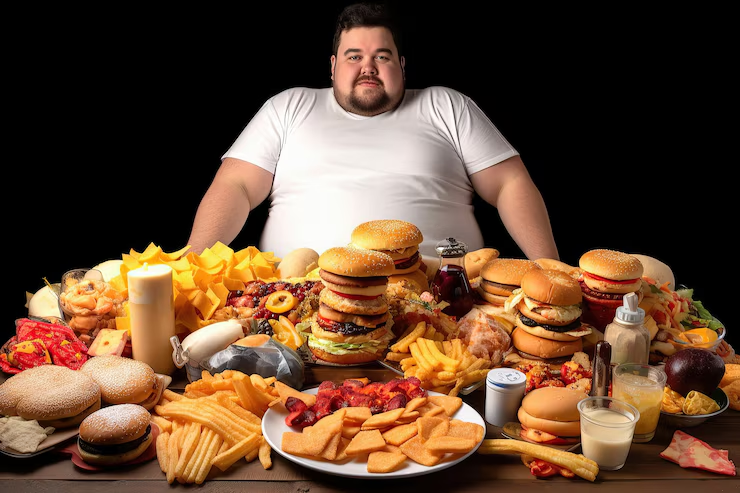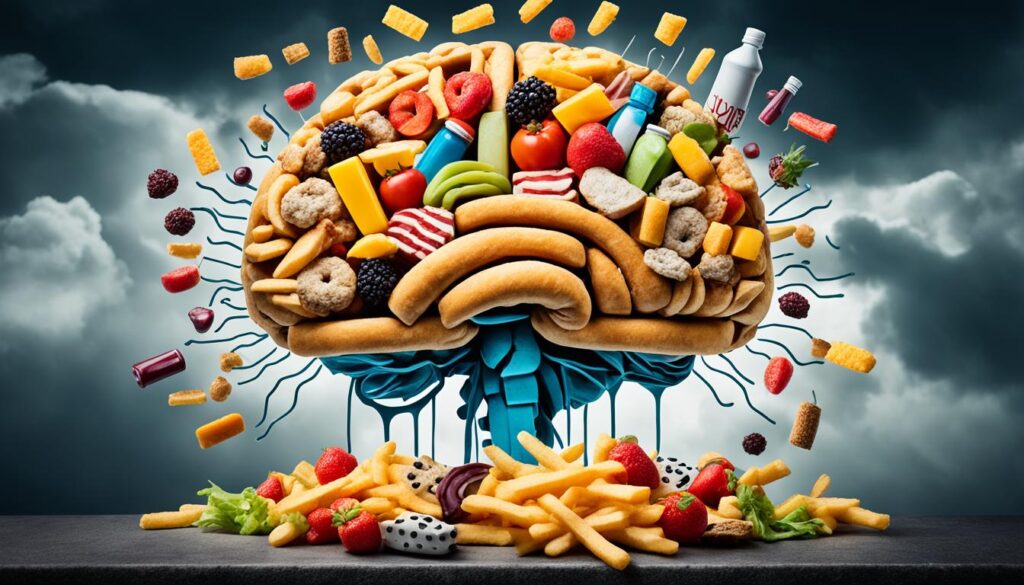The world is facing a big obesity problem. This issue raises the risk of chronic diseases like heart disease and diabetes. Junk food, which is becoming a big part of our lives, can lead to obesity. This is due to our busy lives.
Junk foods include things like burgers, fried chicken, and pizza from fast-food places. Also, packaged foods like chips, biscuits, and ice-cream, and sugary drinks like soda. Fatty meats like bacon, sugary cereals, and frozen meals are also part of it.
These foods are highly processed. This means they go through many steps to make them tasty and easy to eat. But, they give us lots of calories and energy without giving us the nutrients we need. These nutrients are important for our health, like proteins, vitamins, minerals, and fiber.
Key Takeaways : Impact Of Junk Food
- Junk food is highly processed and lacks essential nutrients
- Overconsumption of junk food can lead to obesity and chronic diseases
- Junk food can have short-term negative impacts on health, such as blood sugar spikes and inflammation
- Long-term junk food consumption is linked to an increased risk of chronic conditions like heart disease and diabetes
- Strategies to reduce junk food intake include reading nutrition labels and making healthier meal choices
What is Junk Food and Why is it Harmful?
Junk food is loaded with calories, fat, sugar, and salt but lacks fiber, vitamins, and minerals. It’s often made from processed ingredients and doesn’t give our bodies what they need to work right.
Definition of Junk Food
Junk food means foods high in unhealthy stuff and low in good stuff. Think sugary snacks, fast food, processed meats, and sweet drinks. These foods are seen as “optional” because they don’t help a healthy diet.
Lack of Nutrients and High in Unhealthy Components
Junk food is bad because it’s full of unhealthy fats, sugars, and sodium but low in vitamins, minerals, and fiber. For instance, a fast-food cheeseburger has lots of saturated fat and sodium but not much vitamin C, calcium, or fiber. Eating too much junk food can lead to nutrient shortages and health problems.
On the other hand, eating whole, less processed foods gives us the nutrients we need. Cutting down on junk food and choosing nutrient-rich foods can make us healthier and happier.
Short-Term Effects of Junk Food Consumption

Eating junk food can quickly affect our bodies. One big effect is a fast rise and then a drop in blood sugar levels.
Blood Sugar Spike and Crash
Fast food is often loaded with refined carbs and sugars. These foods break down fast, causing a big jump in blood glucose. This leads to a big insulin response and then a drop in blood sugar.
This rollercoaster of blood sugar can make you feel tired, irritable, and want more unhealthy foods.
Increased Inflammation and Blood Pressure
Eating fast food can also make your body more inflamed. Too much sodium in junk food can mess with your blood vessels. This can cause fluid retention and higher blood pressure.
Nutrient Deficiency and Binge Eating Tendencies
Junk food often lacks important nutrients. Eating it a lot can lead to nutrient shortages. This can make you want to eat more because your body is looking for the quick energy from processed foods.
The short-term effects of eating junk food are big. They range from blood sugar spikes to not getting enough nutrients. These effects can really hurt our health and how we feel.
Long-Term Health Risks Associated with Junk Food

Eating junk food often can harm our health for a long time. These foods are full of calories but lack nutrients. This can make us more likely to get chronic diseases like obesity, high blood pressure, stroke, heart disease, and type 2 diabetes.
Junk foods are high in cholesterol, salt, and sugar. These can cause plaque to build up in arteries. This raises blood pressure and strains the heart. They also lack fiber, which can lead to constipation.
Junk foods can make the brain release dopamine, making us feel happy but also craving more. This can make it hard to stop eating unhealthy foods. It can lead to weight gain and increase the risk of long term health risks of junk food and chronic diseases from junk food.
“Frequent consumption of junk food can lead to a range of serious health problems, including obesity, heart disease, and type 2 diabetes. These conditions can have a significant impact on an individual’s quality of life and long-term wellbeing.”
Studies also link a diet full of junk food to poor memory and learning. It raises the risk of diseases like Alzheimer’s and Parkinson’s. Clearly, eating too much junk food can be very bad for our health and happiness.
Impact Of Junk Food on Obesity and Related Diseases

Junk food greatly affects our health, especially with obesity and chronic diseases. It’s clear that junk food and obesity are linked. Fast food often has a lot of calories, which can lead to weight gain if eaten too much.
Link between Junk Food and Obesity
The USDA says fast food and processed junk foods are very calorie-dense. They have a lot of calories in a small amount. If someone eats more calories than they burn, they will gain weight. This can lead to obesity over time.
Increased Risk of Chronic Diseases
Being obese is a big risk for serious health issues, as the CDC points out. These include heart disease, type 2 diabetes, and some cancers. These diseases are among the top causes of preventable deaths in the U.S.
Staying at a healthy weight helps avoid these diseases. Eating a balanced diet and staying active are key. Choosing to eat less junk food and more whole foods helps improve health and lowers the risk of obesity-related diseases.
| Chronic Disease | Increased Risk Due to Obesity |
|---|---|
| Cardiovascular Disease | Significantly higher |
| Type 2 Diabetes | More than tripled |
| Certain Cancers | Up to 2 times higher |
By understanding the connection between junk food and obesity, we can act to protect our health. This helps lower the risk of serious chronic diseases.
Junk Food’s Impact on Mental Health and Cognitive Function

Eating junk food harms our physical health and can hurt our mental well-being and brain power. Studies now show a strong link between bad eating habits and mental health issues.
Connection to Depression and Anxiety
A 2021 study looked at 322 men and 322 women over 30. It found eating healthy foods like leafy greens, nuts, and fish made people feel better. But, eating fast food had the opposite effect. Women felt worse about junk food than men did.
Impaired Memory and Learning Abilities
Junk food does more than just affect mood; it can also hurt how well we think and remember things. A 2020 study linked diets full of saturated fats and simple carbs to poor memory and learning. Such diets might even increase the risk of Alzheimer’s and Parkinson’s diseases. Also, eating a fatty, sugry breakfast for four days straight can mess with our brain’s learning and memory areas.
The link between junk food mental health and junk food depression is a big worry. Knowing how bad diets affect our mental and brain health helps us make better choices for our well-being.
“Eating lots of junk food doesn’t just affect your waistline – it can also have serious consequences for your mental health and cognitive function.”
Strategies to Reduce Junk Food Consumption
It can be tough to cut down on junk food, but there are ways to help. One good method is to read nutrition labels and understand what health claims mean. The Health Star Rating makes it easy to compare products, but don’t forget to look at the detailed info on the back.
Reading Nutrition Labels and Understanding Health Claims
Health claims on food packaging can be tricky, so don’t just trust the marketing. Always check the nutrition label for sugar, saturated fat, sodium, and other important nutrients. This helps you make choices that fit your health goals.
Meal Planning and Making Healthier Choices
Planning your meals and snacks is another great way to eat less junk food. By making a weekly menu and grocery list, you’ll always have healthy foods ready. This approach saves money and time and helps you resist junk food cravings.
When picking what to eat, focus on whole grains, fresh produce, lean proteins, and healthy fats. These foods give you energy, support your health, and help you avoid junk food. With some planning and awareness, you can cut down on junk food and enjoy a healthier diet.
“The best way to reduce junk food consumption is to make a plan and stick to it. By reading nutrition labels and preparing healthy meals, you can take control of your diet and feel better in the long run.”
Also Read : Top Secrets To Making A Juicy Pulled Pork Sandwich
Conclusion
The evidence is clear: eating junk food often has serious health risks. It can cause sudden blood sugar spikes and increase the risk of obesity and chronic diseases. It even affects mental health. But, we can fight back by making smart food choices and reading labels.
It’s important for both individuals and governments to act together to fight the junk food problem. We need to teach healthy eating habits, especially to young people. By spreading awareness and supporting policies that promote healthy food, we can help people make better choices.
Together, we can create a healthier future by eating less junk and choosing foods that are good for us. By focusing on our health and making thoughtful food choices, we can take back control from the junk food industry. Let’s start with one meal at a time.
FAQs
Q. What is junk food and why is it harmful?
Junk food is high in fats, salt, and sugar but low in nutrients like fiber and vitamins. It’s not good for a healthy diet if eaten too much.
Q. What are the unhealthy components in junk food?
Junk foods are loaded with sugar, salt, and bad fats. They don’t have the good stuff like fiber, vitamins, and minerals our bodies need.
Q. What are the short-term effects of junk food consumption?
Eating junk food can quickly raise your blood sugar and cause inflammation. It can also lead to high blood pressure, nutrient shortages, and a tendency to overeat.
Q. What are the long-term health risks associated with junk food?
Eating too much junk food can make you gain weight and increase the risk of obesity, high blood pressure, stroke, heart disease, type 2 diabetes, tooth decay, and constipation.
Q. How is junk food linked to obesity and related diseases?
If you eat more calories from junk food than you burn, you may gain weight and become obese. This raises the risk of chronic diseases like heart disease, type 2 diabetes, and some cancers.
Q. How does junk food impact mental health and cognitive function?
Eating junk food has been linked to depression, anxiety, poor memory, and lower learning and memory abilities.
Q. What strategies can help reduce junk food consumption?
Reading nutrition labels, understanding health claims, planning meals, and choosing healthier options can all help cut down on junk food. This improves your diet’s quality.
Source Links
- https://www.medicalnewstoday.com/articles/324847
- https://kids.frontiersin.org/articles/10.3389/frym.2022.694523
- https://www.healthdirect.gov.au/junk-food-and-your-health








Leave A Comment